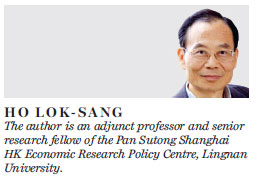True meaning of presas freedom
Updated: 2016-04-06 08:16
By Ho Lok-sang(HK Edition)
|
|||||||
Ho Lok-sang writes that government interference in the media in Hong Kong
is non-existent, but commercial and personal influence on it is unavoidable
The Hong Kong Journalists Association just announced that Hong Kong's Press Freedom Index in 2015 fell for the second year in a row.
The survey was conducted by the University of Hong Kong Public Opinion Programme. It consists of two parts. The public survey part got 1,021 responses from Hong Kong people aged 18 and above who speak Cantonese. This was supplemented by another survey of 446 employees working with newspapers and other media.
The public survey component showed a small decline, falling from 49.4 in 2013 and 48.8 in 2014 to 47.4 in 2015. The media worker component showed a bigger decline, falling over the same period from 42 and 38.9 to 38.2.
Press freedom is a core value of Hong Kong, and it is enshrined in the Basic Law. A decline in press freedom would no doubt be a big concern to Hong Kong. But is Hong Kong's press freedom really that bad? Since both scores are out of 100, the figures would seem worrying.
A closer look into the cause of the decline of "press freedom" and the nature of the decline, however, suggests that reference to a decline of press freedom is a red herring. As far as I know, the real concern is not over press freedom.
To me press freedom is about government intervention into lawful reporting or government intervention into the composition of editorial or management staff of press outlets. I am not aware of any such things happening in Hong Kong.
We need to know that reporting is done by people and the press are managed and owned by private interests. Human beings are all subject to bias and self-interest considerations. Freedom of the press, however, means that the government is not in the position to interfere with reporting and commentaries that stay within the law. The government cannot guarantee that the press is free from distortions based on political, commercial or personal considerations.
One of the concerns expressed by the public is possible intervention by the owners of media over reporting. But this is not really a problem of press freedom, unless the owner's intervention is a result of the government putting pressure on them. Owners are human beings just like reporters are. Owners run news media for a reason. If they decide that a commentary or a news report goes against their beliefs or their interests or if they consider them biased, they certainly will want to intervene. Can media workers fairly claim that their reports and commentaries are all free from bias and free from all interests? It is also understandable that some advertisers may not like the views implicit or explicit in some reports or commentaries and for that reason refuse to advertise in media that they believe go against their interests. But this has nothing to do with press freedom as enshrined in the Basic Law. Press organizations operate in the marketplace and indeed have to contend with the preferences of readers and advertisers. But this is not a press freedom issue.
More than 86 percent of media workers say that press freedom was severely or moderately damaged because the individuals who attacked reporters during the "Occupy" movement had still not been charged more than a year after the incidents. Reporters are of course justifiably concerned about their own safety. But we need to know that charges can only be made when the evidence is strong enough to secure a reasonable chance of conviction. Attacks on reporters are indeed a threat to press freedom, and the police should certainly arrest and charge the perpetrators whenever the arrests and charges are justified. But we need to realize that this threat to press freedom comes from the public, and not from the government.
As a reader of different newspapers and a viewer or listener of broadcast and online programs, I am impressed by the diversity of views in our local press, which testifies to the latitude of opinions allowed in the press. But as I have written before, I am irritated by news reports which are prejudiced by a political stance, and angered by made-up stories which still abound, especially in online media. I still think that news reports should just report the facts, while commentaries should be left to the opinion or editorial pages.
An author whose submissions to a newspaper are declined cannot just complain that the rejection of their submissions means press freedom has been compromised. By the same token, reporters and commentators have to face the fact that others may not agree with their reports or views and the owner or the editor may change the editorial arrangements or even reject articles. After all, the owner is not there to sponsor freewheeling editors and reporters to write things any way they like.
To me, the cornerstone of press freedom is that editors and reporters who disagree with owners can always team up to establish their own company and then they can write whatever they like, as long as they stay within the law. The Basic Law guarantees this right. There is no evidence this basic right has been compromised.

(HK Edition 04/06/2016 page10)